DOCTRINAL POLICY
Dallas Bible Theological Institute subscribes to the Great Commission (Matthew 28:18-20) and Great Commandment (Matthew 22:37-40) as its best practice (John 14) for biblical education. Sharing the gospel is our mandate according to Acts 1:8 and Romans 10:8-9.
- The Scriptures. We believe that God inspired the Old and New Testaments. This refers to the autographs as written by the prophets and apostles. The Bible is inerrant and infallible without mistakes in the original documents. We believe Scripture reveals the mind of God to man and points to the Lord Jesus Christ and the only way of Salvation through Christ. The Scriptures are the only infallible guide for our daily thought-life and our practical, moral, and spiritual instruction. [Mk. 12:26, 36; 13:11; Lk. 24:27, 44; Jn. 5:39; Acts 1:16; 17:2-3; 18:28; 26:22-23; Rom. 15:4;1 Cor. 2:13; 10:11; 2 Tim. 3:16; 2 Pet. 1:21]
- The Godhead. We believe in the oneness of God and His eternal existence in three persons – Father, Son, and Holy Spirit – and these three are one God (co-equal, co-eternal, and co-existent) – having the precise same nature, attributes, and perfections and worthy of precisely the same honor, confidence, and obedience. The Father, Son, and Holy Spirit each are distinct from each other and have distinct roles. [Mt. 28:18-19; Mk. 12:29; Jn. 1:14; Acts 5:3-4; 2 Cor. 13:14; Heb. 1:1-13; Rev. 1:4-6]
- God the Father. We believe that God the Father is the First Person of the Trinity, who was appeased by His Son’s death and shedding of blood on the cross. The role of the Father is initiating, commanding, directing, and sending, which is the appropriate position of the Father, after whom all human fatherhood is patterned. In love and for our salvation, Jesus Christ (after the Incarnation) was exalted far above all rule, authority, power, dominion, and above every name. The Father has subjected all things to His Son and gave him head over all things of the church. [Jn. 3:16; Jn. 12:49; 14:16; Eph. 1:20-21; 3:14-15; Rom. 3:24-25; Heb. 2:17; Pet. 2:9-11; 1 Jn. 2:2]
- God the Son. We believe that Jesus Christ, the Second Person of the Trinity, is perfect in deity and humanity (fully God and fully Man). Jesus Christ, in concert with God the Father and God the Spirit, raised Him from the dead. He is a propitiation for our sins and the whole world. Christ will return for His church (the Rapture) before the Great Tribulation period. He will return with His saints at His Second Coming, to reign on earth for 1,000 years. [Mt. 1:23; Jn. 10:17-18; Jn. 2:19; 10:28; 14:2-3; Rom. 8:11; 1 Cor. 15:3-4; Gal. 1:1-4; Eph. 1:17-20; Col. 2:9; 1 Pet. 3:18; 1 Thess. 4:16-17; Rev. 19:14; 20:2-7]
- God the Holy Spirit. We believe that the Holy Spirit, the Third Person of the Trinity, though omnipresent from all eternity, took up His abode in the world, on the day of Pentecost according to the divine promise. By His baptism, He unites all to Christ in one body and indwells every believer. As the indwelling One, He is the source of all power, all acceptable worship and service, and all spiritual gifts. [Jn. 14:16-17; 16:7-15; 1 Cor. 6:19; 13:8-10, 31; Eph. 2:22; 2 Thess. 2:7]
- Salvation. We believe that salvation is by grace through faith alone; it is a gift from God the Father; unmerited on our part; we are redeemed through the shed blood of Jesus Christ. [Jn. 1:11-17; 3:16; 6:44; Eph. 2:8-9, Titus 2:11; Rom. 3:28; 5:1-2; Heb. 9:22]
- Eternal Security. We believe in the eternal security of the believer. As soon as a person is saved, the believer becomes complete in Christ. The believer is sealed until the day of redemption. [Jn. 10:27-29; Rom. 8:29-39; Jn. 10:28; 11:25-26; Phil. 1:6; 1 Pet. 1:3-5; Cor. 1:22; Heb. 7:25; Rom. 5:10-11]
- Body of Christ. We believe that all those who believe in the Person and Work of Christ on the Cross are born again for eternity and are members of the Church. [Ezek. 34:26; Eph. 2:8; 4:30; Jn. 5:24; 1 Pet. 1:23; Jn. 3:14; 1 Pet. 1:3; 2 Cor. 5:17; 1 Cor. 6:11; Rom. 8:2-6; 2 Cor. 5:21]
- Justification, Sanctification and Glorification. We believe that the believer is justified from the penalty of sin because of Jesus’ sacrificial death on the Cross. Sanctification delivers individuals from the power of sin through the Holy Spirit. Individuals retain their old sin nature, which is not removed in this life, but the provision is made by the Holy Spirit for daily victory over sin. The work of the Holy Spirit is reproving, convicting, sealing, baptizing, instructing, indwelling, and filling. Glorification delivers the believer from the presence of sin. [Jn. 3:3-7, 31; Jn. 7:37-39; Acts 11:15-17; Rom. 8:9-11; Eph. 4:30; 1 Cor. 12:13; 2 Cor. 1:22; Eph. 1:13-14; 1 Cor. 1:22; 6:15; Eph. 4:4-5,16; 5:18; Jn. 3:6; Rom. 5:12-14; 7:14-17; 12:22;2 Cor. 4:16; Gal. 5:16-17]
- Blessed Hope. We believe that the next great event in the fulfillment of prophecy will be the coming of the Jesus Christ in the air referred to as the rapture. He will receive believers unto Himself into heaven, and this event is referred to as the blessed hope. [Jn. 14:1-3; 1 Cor. 15:51-52; 1 Thess. 4:13-18; Titus 2:11-14].
- Eternal State. We believe that at death, the spirit of those who trusted in the Lord Jesus Christ for salvation pass immediately into the Lord’s presence and remain in conscious bliss until the resurrection of the glorified body.[1 Corinthian 15 ; Luke 16:19-26; 23:42; 2 Cor. 5:8; Phil. 1:23; 2 Thess. 1:7-9; Jude 6-7; Rev. 20:11-15]
For inquiries about DBTI doctrinal statement, send an email to: info@dbti.org.

